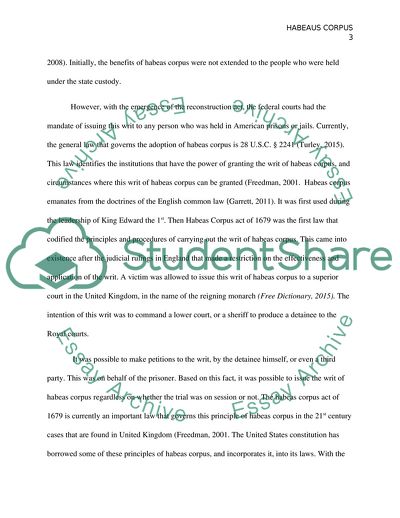Cite this document
(Habeas Corpus and its Applicability in the United States Essay Example | Topics and Well Written Essays - 2000 words - 1, n.d.)
Habeas Corpus and its Applicability in the United States Essay Example | Topics and Well Written Essays - 2000 words - 1. https://studentshare.org/politics/1859371-the-right-of-habeas-corpus-in-the-context-of-the-war-on-terror
Habeas Corpus and its Applicability in the United States Essay Example | Topics and Well Written Essays - 2000 words - 1. https://studentshare.org/politics/1859371-the-right-of-habeas-corpus-in-the-context-of-the-war-on-terror
(Habeas Corpus and Its Applicability in the United States Essay Example | Topics and Well Written Essays - 2000 Words - 1)
Habeas Corpus and Its Applicability in the United States Essay Example | Topics and Well Written Essays - 2000 Words - 1. https://studentshare.org/politics/1859371-the-right-of-habeas-corpus-in-the-context-of-the-war-on-terror.
Habeas Corpus and Its Applicability in the United States Essay Example | Topics and Well Written Essays - 2000 Words - 1. https://studentshare.org/politics/1859371-the-right-of-habeas-corpus-in-the-context-of-the-war-on-terror.
“Habeas Corpus and Its Applicability in the United States Essay Example | Topics and Well Written Essays - 2000 Words - 1”. https://studentshare.org/politics/1859371-the-right-of-habeas-corpus-in-the-context-of-the-war-on-terror.


